Ethereum wallets have become indispensable for individuals owning Ethereum-based tokens in 2025. These digital tools enable users to seamlessly send, receive, and securely store their Ethereum-based assets. Nowadays, Ethereum wallets provide multifaceted functions, supporting NFTs and enabling advanced blockchain interactions like staking, liquidity pooling, and DeFi activities.
Ethereum wallets have evolved significantly, with numerous companies entering the space. Our comprehensive guide to the top Ethereum wallets examines various options, highlighting their distinctive attributes and how they align with the current trends and user needs in the Ethereum ecosystem.
What are Ethereum wallets?
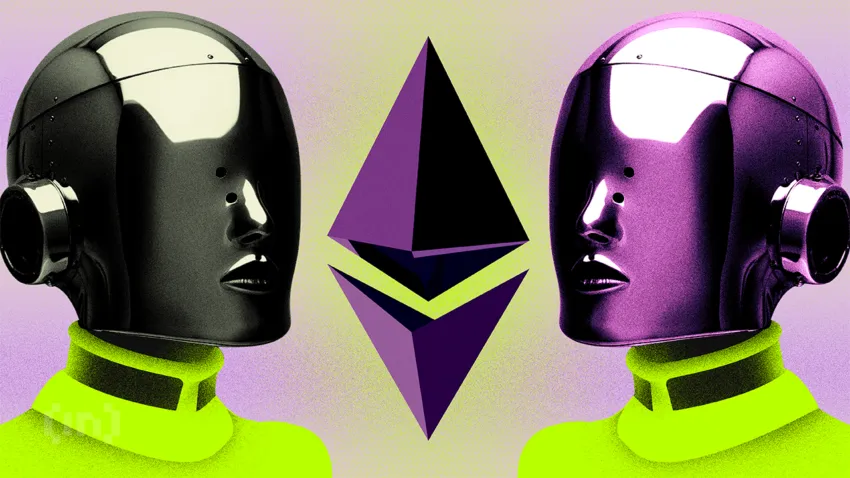
Ethereum wallets, serving as standard crypto wallets, seamlessly manage and store ETH transactions. They often support various other token types as well. These wallets function by actively managing your keys: a public key, which acts like a visible account address, and a private key, your confidential account password. Ethereum provides diverse wallet options, such as paper, mobile, and hardware wallets, within the blockchain ecosystem. Before selecting an Ethereum wallet, here are some key factors you should consider:
What to look for in Ethereum wallets
When selecting an Ethereum wallet, remember that factors like security features, user interface, and compatibility with different tokens are crucial. Here are several aspects to consider:
- Security: A wallet must prioritize the safety of your funds to protect against hackers and cyberattacks. Look for wallets that support credible tokens and offer complex password settings.
- Ease of use: Your Ethereum wallet should be easy to navigate. It should allow straightforward sign-up, registration, and transactions.
- Asset recovery: This feature is vital if you lose your wallet or device access. Ethereum wallets should offer a recovery phase and backup options for quick fund recovery, which is essential for mobile and hardware ETH wallets.
- Additional features: Look for wallets with extra capabilities like built-in exchanges, browsers, and compatibility with specific decentralized applications (DApps). Built-in exchange functions make buying or trading Ether convenient.
- Clear terms: Although often overlooked, clear terms and conditions are important. The ideal Ethereum wallets will have straightforward policies on functionalities, multi-factor authentication, and fees, which can be crucial in disputes.
Best Ethereum hardware wallets
1. Ledger Nano X
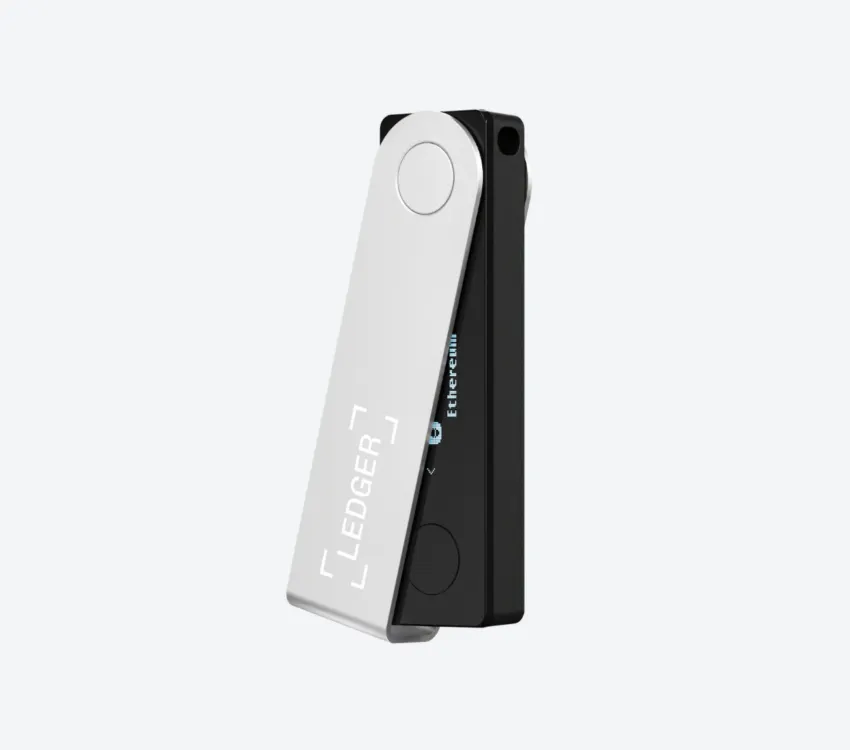
A renowned French wallet manufacturer in the crypto sector offers the Ledger Nano X, a hardware wallet known for its simplicity and robust security features. Like a standard flash drive, the Nano X securely stores Ether offline, providing critical protection for your funds.
This wallet’s standout feature is its straightforward design. It securely holds private keys without internet connectivity, ensuring remote access protection. Additionally, the Nano X is compact and lightweight at just 34 grams, offering portability and discretion. It has a USB Type C cable, an instruction booklet, a keychain strap, and sheets for recording your recovery phrase.
Notably, the Nano X boasts a larger built-in screen and can store up to 100 wallet apps, significantly more than its predecessors. Unlike the Nano S Plus, which also holds 100 apps but lacks Bluetooth and mobile compatibility, the Nano X includes these features and an inbuilt battery, enabling operation without a constant power connection.
Pros
- Multiple cryptocurrency support
- User-friendly interface
- Ledger wallets offer data backup and restoration using a recovery seed, allowing access to your wallet and funds if the device is lost, stolen, or damaged.
Cons
- Not the cheapest option for hardware wallets
Don’t skip on security — get the reliable Ledger wallet today!
2. Trezor One
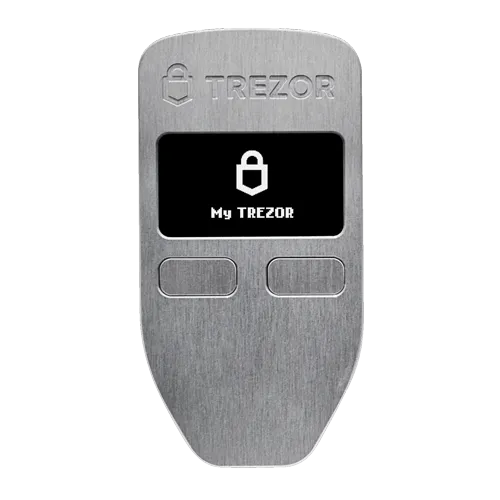
If there’s ever a yang to Ledger’s ying, it’s SatoshiLabs’ Trezor. Both firms have battled it out in the wallet manufacturing space for years. While the Nano X is considered Ledger’s magnum opus, Trezor has the Trezor One. Firstly, this wallet is smaller and more inconspicuous than the Ledger Nano S. Yet, the Trezor One is still pretty impressive. Most importantly, the Trezor One supports Ethereum and other ERC-20 tokens.
Trezor builds an isolated environment where it completes transactions offline, thus minimizing the risk of someone getting a hold of your private key. There is a 24-word recovery phrase for wallet recovery in cases of theft or faulty devices.
Advantages
- Easy to use
- It can be used on all platforms
- Top-level security
Disadvantages
- The screen can be quite small
- One of the more popular Ethereum wallets
On the market for a reliable Ethereum hardware wallet? Get the Trezor wallet today!
3. KeepKey
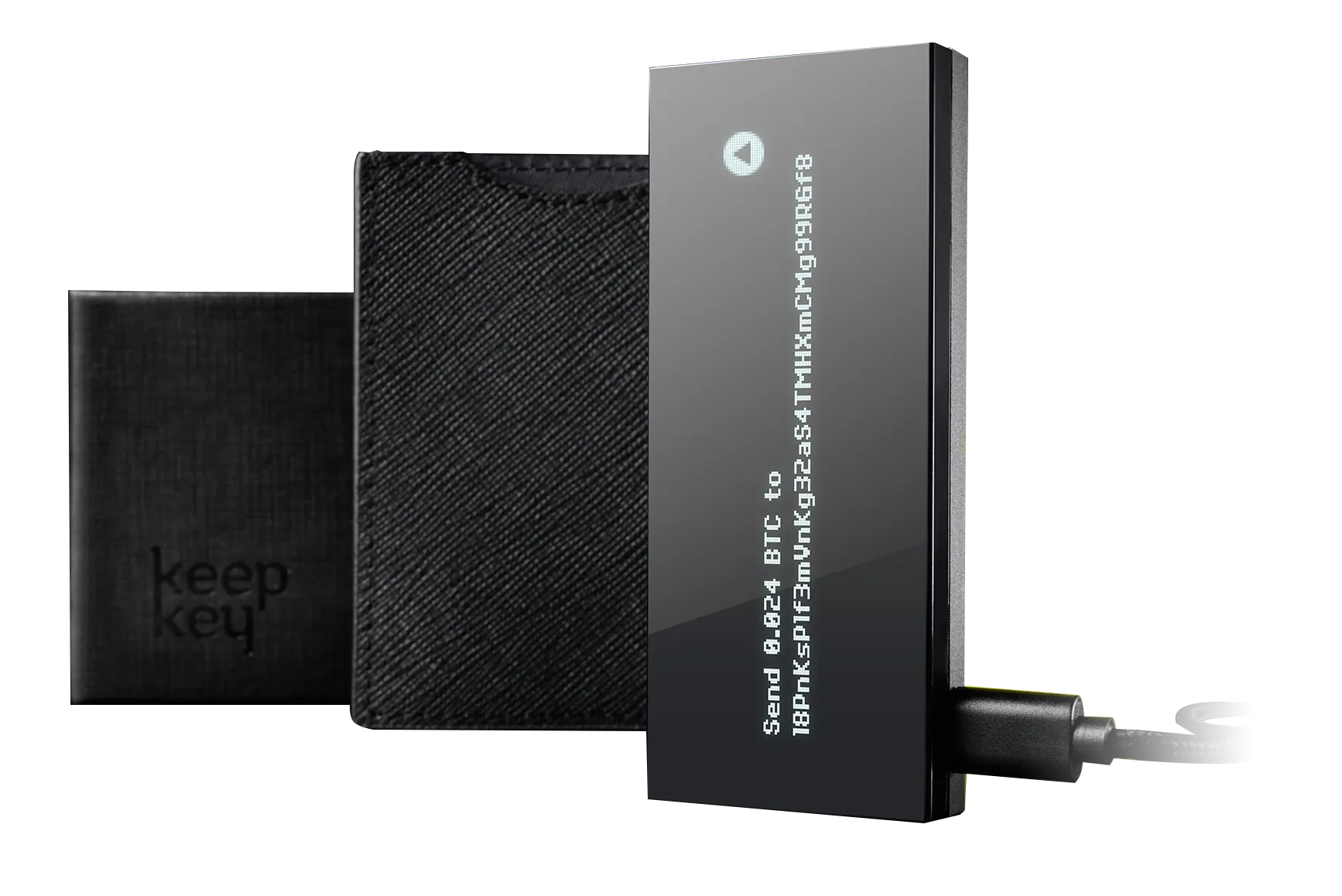
This next Ethereum hardware wallet is more on the pricier end of our list. Like most hardware wallets, a Hierarchical Deterministic (HD) wallet generates new addresses for every new transaction. KeepKey stores your keys in an offline, secure environment, offering many of the same security features as its more famous hardware counterparts. It’s compatible with Android, macOS, Windows, and Linux.
This wallet combines many security features to keep your ETH safe. This device can generate infinite private keys using entropy from the computer and store them. Hence, the wallet is protected with a PIN to prevent unauthorized use. Additionally, a physical button needs to be long-pressed before transactions can be confirmed.
Pros
- Strong security
- Cold storage
- Reliable hardware wallet
- Larger screen compared to other Ethereum wallets
Cons
- Not portable
- Quite expensive
- No transaction fee estimates
The top Ethereum desktop web wallets
1. MetaMask
MetaMask is an open-source Ethereum web wallet with Brave, Chrome, and Firefox browsers. This Ethereum web wallet provides an interactive user interface and a secure identity vault, allowing users to manage their identities across various platforms.
MetaMask has an in-built Ether purchasing feature that links the web wallet to popular cryptocurrency exchanges like Coinbase to buy Ether and other ERC20 tokens. Developers can also interact with several test networks on the Ethereum network — making complete use of the Blockchain technology. Users also don’t need to download the full Ethereum node to operate MetaMask.
MetaMask’s Swaps feature consolidates prices from various aggregators and market makers, ensuring access to a wide range of tokens at competitive prices. A service fee of 0.875% is included in each quote, which is used to fund further development and improvements of MetaMask.
Pros
- User-friendly setup
- It’s an excellent tool for developers
- Helps to manage multiple wallets
- Can support smart contracts
Cons
- It can get slow at specific points
- It could be confusing for newbies
2. Exodus
Exodus Wallet is an ideal choice for beginners seeking an Ethereum web wallet that’s easy to use and offers advanced features. It’s designed as a multi-chain wallet for basic tasks like checking account balances.
Exodus allows for seamless integration between devices on both desktop and mobile platforms. It partners with various exchanges, enabling users to purchase Ether from multiple sources. Unlike online wallets, where private keys are stored with a custodian, Exodus holds your private keys on your device, enhancing security. The wallet also supports easy backup without keeping your keys on a server, ensuring peace of mind.
Moreover, Exodus applies a spread of two to five percent for Ether transactions, which is how the wallet generates revenue. This fee structure is important to consider when using the wallet for transactions.
Pros
- Built-in exchange
- Strong backup features over other Ethereum wallets
- Intuitive design
- Offers Trezor integration
Cons
- High exchange fees
- No two-factor authentication
3. MyEtherWallet
MyEtherWallet (MEW) is perhaps the most popular wallet provider for Ethereum. This web-based wallet provides access to Ethereum, Ethereum Classic, and other Ethereum (ERC-20) tokens. It’s one of the most popular Ethereum wallets available, thanks in no small part to its ease of use and expansive security features.
Pros
- Open-source software
- Simple and intuitive interface
- It can be integrated with hardware wallets
Cons
- The web version is difficult to set up
- Past incidences of phishing attacks
The leading Ethereum mobile wallets
1. YouHodler
YouHolder, based in Switzerland, is a multi-coin crypto wallet that lets you store several other assets besides Ethereum. The wallet is available on both desktop and mobile devices, and the team has designed it to be intuitive and streamlined.
The platform offers several features in a bid to be an all-in-one service, and you can buy over 50 crypto assets. The team has put security in mind first, showing an understanding of the fact that it is a custodial wallet. You can withdraw your money anytime; the team does not lock funds.
Pros
- Wide range of supported assets
- Robust data security
- Enables borrowers to access up to 90% of their collateral’s value
Cons
- Regulatory status may vary by region
2. Atomic Wallet
The Atomic Wallet is a desktop and mobile Ethereum wallet that provides smooth and seamless storage solutions for Ether and ERC-20 tokens. This wallet allows users to buy, store, and stake cryptocurrencies from one interface.
The wallet allows users to acquire cryptocurrencies using a credit card, in-wallet peer-to-peer trades, and atomic swaps, which allows for the exchange of one cryptocurrency for another without using go-betweens like exchanges.
The Atomic wallet is simple and easy to use, and it comes with a dedicated interface for ERC-20 tokens too. The wallet encrypts your private keys on your device and is available on mobile and desktop platforms. It also comes with an Ethereum wallet iOS version and an Ethereum wallet Android version.
Pros
- Sleek user interface
- Credit card functionality
- It comes with a built-in exchange
Cons
- There is no hardware wallet integration like some other Ethereum wallets
3. Guarda Wallet
Guarda, an Ethereum wallet available for desktop and mobile devices, stands out for its non-custodial nature, providing users full control and responsibility for safeguarding their funds. The wallet’s code is open-source, meaning the public can inspect it to ensure no malicious software could compromise investors’ assets. Additionally, Guarda extends its functionality beyond just a wallet: it’s also available as a web wallet and a browser extension.
This wallet addresses more than just the basic “How to store Ethereum?” question. It supports integration with Ledger, a leading ETH hardware wallet, enhancing its security features. Guarda also includes exchange functionalities, allowing users to purchase Ether using a debit card. In contrast to many hybrid wallets that lack efficient support systems, Guarda provides a ticket-based system for user complaints and a comprehensive FAQ section on their website.
Pros
- Open-sourced wallet
- Chrome extension
- Debit card purchases
Cons
- High exchange fees
4. Trust Wallet
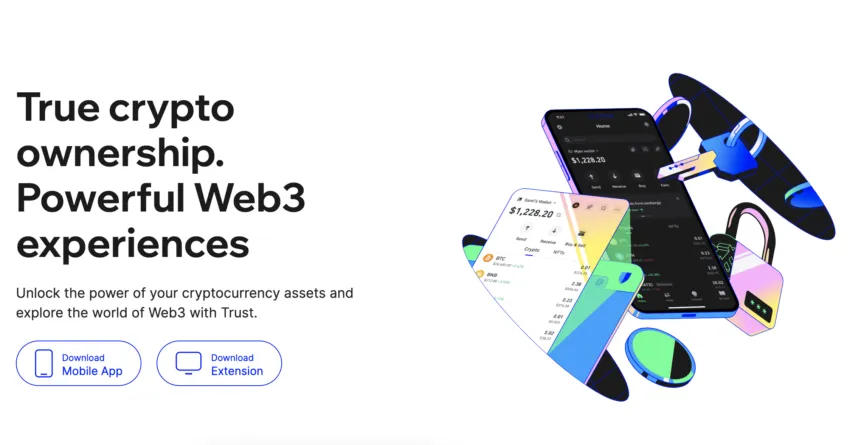
The Trust Wallet is a mobile wallet that allows you to send, store, and receive assets on the Ethereum blockchain. Users can also write smart contracts with this wallet. It’s an open-source wallet built with a focus on simplicity, and it’s quite easy to use.
With the Trust Wallet, you store your private keys on your device. The wallet also comes with an adequate backup facility. If you like purchasing funds on a decentralized exchange (DEX), you’ll probably enjoy this wallet, thanks to its partnership with the Kyber Network. Still, Android users can enjoy integration with Coinbase, Changelly, and Shapeshift for Ether purchases.
Pros
- Built-in exchange
- Web3 browser for DApp integration
- Built on the Ethereum blockchain
- Available on both Android and iOS
Cons
- Limited exchange capabilities with other assets
How to store Ethereum safely: Ethereum paper wallets
A paper wallet is considered the safest way to store your cryptocurrencies long-term, as it’s not connected to the internet in any way, shape, or form. Paper wallets are a piece of paper with a QR code on them.
Also, Ethereum holders can scan that QR code to access their assets whenever they’d like. But because this process is a pain, it’s only recommended you do this if you want to hold for a long time.
Many crypto traders laminate and bury their paper wallets, planning to wait decades before pulling them out to use the stored private keys. Ensure this wallet is never torn or damaged, which could cause you to lose access to Ethereum forever.
Which Ethereum wallet is best for you?
Choosing the right Ethereum wallet depends on your needs and how you plan to use ETH. Online or mobile wallets are a practical choice for beginners or those who don’t expect to handle large amounts of Ether. These wallets function like mobile apps, offering easy access to sending and receiving funds. Among these, mobile wallets generally provide better security than their online counterparts.
For those seeking an extra layer of security, hardware cryptocurrency wallets are a reliable option. They provide robust protection for your digital assets, but it’s important to safeguard the wallet and properly maintain it physically. Remember, Ethereum wallets come with various additional features, so it’s important to always DYOR (Do Your Own Research) before making a final decision.
Frequently asked questions
What is the best ethereum wallet?
Is Metamask an ETH wallet?
What is the best free ETH wallet?
Is Coinbase an ETH wallet?
Disclaimer
In line with the Trust Project guidelines, the educational content on this website is offered in good faith and for general information purposes only. BeInCrypto prioritizes providing high-quality information, taking the time to research and create informative content for readers. While partners may reward the company with commissions for placements in articles, these commissions do not influence the unbiased, honest, and helpful content creation process. Any action taken by the reader based on this information is strictly at their own risk. Please note that our Terms and Conditions, Privacy Policy, and Disclaimers have been updated.




